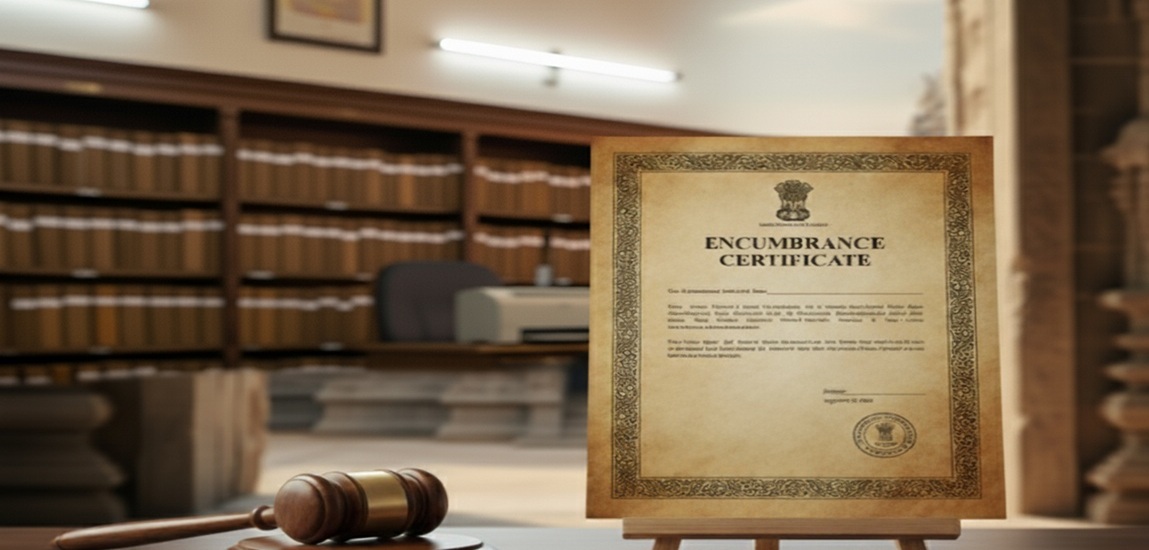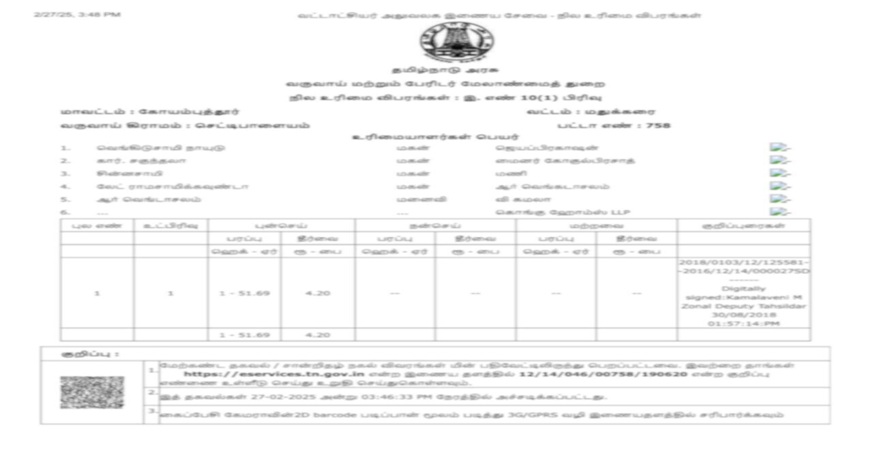What is a Digitally Signed Encumbrance Certificate (EC) of Tamil Nadu?
A Digitally Signed Encumbrance Certificate (EC) is an official property document issued by the Tamil Nadu Registration Department. It provides a legal record of all registered transactions for a specific property — including sale deeds, mortgages, leases, and legal claims — over a selected period. Unlike ordinary ECs, this version is digitally signed by the Sub-Registrar, making it legally valid, and widely accepted by banks, courts, and municipal bodies. It confirms whether a property has a clear title and no outstanding financial or legal encumbrances.Why is a Signed Encumbrance Certificate(EC) Important and why do you need it for Property Transactions in Tamil Nadu?
A Signed EC is essential for property buyers, sellers, banks, and legal heirs in Tamil Nadu:- It confirms clear title before buying or selling land
- It is mandatory for home loans and mortgages
- It is used in court cases and property inheritance claims
- It supports property tax corrections and building approvals
How to get and view Signed Encumbrance Certificate(EC) Online in Tamilnadu?
You can now apply for a digitally signed EC online without visiting the SRO:- Open mypatta and log in or sign up if needed.
- Go to property documents, ensure “Tamil Nadu” is selected as the state, then tap the “Signed EC” icon.
- Enter your property details such as Zone,District,Village ,SRO ,Survey and Subdivision number
- Tap “Search”
- Once Digitally Signed EC is available and you can download EC online, tap to “View Document”. You can now Download/Share/Save this document in PDF on your device.
What Information does a Digitally Signed Encumbrance Certificate(EC) Contain?
The TN Digitally Signed EC provides a chronological summary of all property-related registrations. Key information includes:- Property Identification: Survey number, subdivision, village, and SRO jurisdiction
- Owner Name: Name of the registered owner
- Registration Dates: Date of each deed
- Document Type: Sale deed, mortgage, lease, partition, gift, etc.
- Encumbrance Details: Loans, charges, and lien records
- Document Number: Registration number and year of each transaction
How Is Signed EC Different from a Certified Copy/Nakal ?
While the Certified Copy proves current ownership, Digitally Signed EC traces the legal and financial history. It helps identify any unresolved debts or mortgages, making it essential for due diligence.Common Use Cases for a Digitally Signed EC in Tamil Nadu
- Buying Property: Buyers request it to confirm that the seller holds a clear, debt-free title.
- Applying for a Home Loan: Required by banks to ensure the land is not already mortgaged.
- Selling Property: Sellers use it to gain trust by showing the property has no legal burdens.
- Property Mutation: Needed to update ownership details in local revenue and municipal records.
- Legal Disputes: Used in court to show chain of ownership or resolve inheritance claims.
- Partition or Gifting: Ensures that the land being gifted or divided is free of third-party claims.
- Inheritance Planning: Legal heirs use EC to verify what the deceased actually owned.
- Construction Approval: Required by municipalities before issuing building permits.
- Property Tax Updates: Supports correction or clearance of old tax liabilities.
- NRI Property Check: NRIs use it to verify property title remotely before purchase.
- Audits: Individuals and businesses periodically obtain ECs for compliance checks.
Frequently Asked Questions (FAQs)
Is a digitally signed Encumbrance Certificate mandatory for property transactions?
Yes, a digitally signed Encumbrance Certificate is often mandatory for property transactions to verify the legal and financial status of the property, ensuring there are no disputes or liabilities.
Can a digitally signed Encumbrance Certificate show undisclosed encumbrances?
No, the digitally signed Encumbrance Certificate only reflects transactions or liabilities officially registered with the government. Any unregistered encumbrances will not appear.
What happens if there’s an encumbrance on the property?
If an encumbrance is recorded, the details will be mentioned in the EC, and it is advisable to resolve it before proceeding with any transactions.
Can I use a digitally signed Encumbrance Certificate for bank loans?
Yes, a digitally signed Encumbrance Certificate is accepted by most banks and financial institutions for loan processing, as it is legally valid and certified.
Can I request a digitally signed Encumbrance Certificate for any time period?
No, digitally signed Encumbrance Certificate is only available from 1975 in Tamil Nadu.
Key Takeaway
- The Digitally Signed Encumbrance Certificate (EC) is a must-have document for any property transaction in Tamil Nadu.
- It is a legally valid, government-issued record showing all past transactions on your land or house.
- The Signed EC is digitally verifiable and accepted for all legal and financial processes.
- Get your Digitally Signed EC online through mypatta—fast, paperless, and reliable.
Other Blogs link
1.https://mypatta.in/blog/tslr-sketch/
2.https://mypatta.in/blog/understanding-tslr-extract-in-tamil-nadu-a-comprehensive-guide/
3.https://mypatta.in/blog/understanding-a-register-extract-in-tamil-nadu-a-vital-land-document/
4.https://mypatta.in/blog/certified-copy-nakal-in-tamil-nadu-how-to-get-it-online-its-purpose-faqs/
8.https://mypatta.in/blog/patta-chitta-of-tamil-nadu-how-to-get-it-online-its-purpose-faqs/


